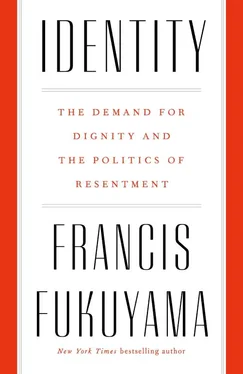Both nationalism and Islamism—that is, political Islam—can be seen as two sides of the same coin. Both are expressions of a hidden or suppressed group identity that seeks public recognition. And both phenomena arise in similar circumstances, when economic modernization and rapid social change undermine older forms of community and replace them with a confusing pluralism of alternative forms of association.
7
NATIONALISM AND RELIGION
Luther, Rousseau, Kant, and Hegel understood dignity in different ways. But they were universalists insofar as they believed in the equality of dignity of all human beings based on their potential for inner freedom. Yet the demand for recognition often takes a more particular form, centering on the dignity of a particular group that has been marginalized or disrespected. For many, the inner self that needed to be made visible was not that of a generic human being, but of a particular kind of person from a particular place and observing particular customs. These partial identities could be based on nation, or they could be based on religion. Because they demanded recognition of the dignity of the group in question, they turned into political movements that we label nationalism or Islamism.
The thinker who was critical in shifting the focus of recognition struggles away from an individual if universally shared freedom to collective freedom based on particular national or cultural characteristics was Johann Gottfried von Herder, a late-eighteenth-century student and contemporary of Kant. Herder has often been attacked as the father of modern European ethno-nationalism, a writer who celebrated the primitive Volk , or people, and was a distant precursor of Adolf Hitler.
This view is highly unfair to a thinker who has been inadequately read and studied in the English-speaking world. Herder shared many of Kant’s Enlightenment views about human equality, but spent far more time reading broadly the travel literature of Europeans who had visited obscure foreign lands and recorded their observations of local customs. In Reflections on the Philosophy of the History of Mankind , Herder states clearly that there is a single human species, and he attacks other authors who have tried to establish hierarchies among the world’s races. He empathizes with the pain of Africans taken in slavery and asserts that cultures can be measured by their treatment of women. In a period well before the discovery of modern genetics, he had an amazingly sophisticated understanding of the complex interaction between biological characteristics and environment in shaping behavior. {1} 1 Johann Gottfried von Herder, Reflections on the Philosophy of the History of Mankind (Chicago: University of Chicago Press, 1968).
Nonetheless, Herder argued that each human community is unique and separate from its neighbors. He notes that climate and geography have had huge impacts on the customs of different peoples, each of which expresses its own “genius” in the ways they have adapted to local circumstances. Unlike Hegel, who simply wrote off Africa as irrelevant to human history, Herder took a sympathetic view of non-European cultures. Like a contemporary cultural anthropologist, he was more interested in describing than in evaluating other peoples. And, in an age well before the big European push to colonize the globe, he issued a warning that contemporary nation-builders might take to heart: “Let it not be imagined, that human art can with despotic power convert at once a foreign region into another Europe.” {2} 2 Ibid., 31.
Herder’s link to modern nationalism is clear. His work sought to promote an appreciation for the unique customs and traditions of each of the world’s people. Like Rousseau, he did not believe that those who lived in later historical times were necessarily better or happier than the “primitive” peoples who came before. He agreed that society could force us to play false roles. In doing so, he staked out a position very different from that of Hegel, who in the following generation would argue that history was universal and progressive. {3} 3 Herder was no particular fan of the absolute monarchies of his day and did not believe they were more conducive to human happiness than the stateless societies of North America or Africa. See Johann Gottfried von Herder, J. G. Herder on Social and Political Culture (Cambridge: Cambridge University Press, 1969), 318–19.
Herder applied his idea of cultural authenticity to the Germany of his time, which was divided into countless petty principalities, many of which sought to emulate the splendor and culture of the French court at Versailles. Herder argued that the Germans needed to take pride in their own culture and traditions rather than seeking to be second-rate Frenchmen. He sought recognition, not for an abstraction like the “Man” in the Rights of Man, but rather for his particular people and, by extension, every other human community.
The “long nineteenth century” that stretched from the French Revolution to the outbreak of World War I in 1914 saw two versions of dignity and two approaches to identity in competition with each other. The first sought recognition of the universal Rights of Man (not, at that point, necessarily of women as well). The other sought recognition of the dignity of particular peoples who had been oppressed or held in bondage by others. These different versions of dignity, universal and national, contended with each other over decades; the revolutions of 1848, for example, were fought in the name both of liberal rights and of national self-assertion. By the early twentieth century, the liberal version of dignity was joined by another universalist doctrine, Marxist socialism, which would fight for the rights of proletarians. Both the liberal and the socialist movements contended with nationalism through the two world wars; after fascism’s defeat in 1945, the two universal doctrines emerged as the poles around which global politics was organized during the Cold War. But nationalism was never fully discredited, despite institutions such as the European Union that were designed to keep it in check, and has reemerged as a new force in the twenty-first century.
Ideas were important to understanding the rise of nationalism, but important economic and social changes were also taking place that prepared the ground for its emergence in nineteenth-century Europe. The old European order of the Middle Ages was hierarchical and stratified according to social class; feudalism divided Europe’s populations into countless tiny jurisdictions and was designed to lock them into place.
A modern market economy, by contrast, depends on the free movement of labor, capital, and ideas from places where they are abundant to places where they can earn a high return. The universal recognition offered by liberal societies was particularly conducive to capitalist development, since it protected individuals’ freedom to engage in commerce from the state and preserved their right to own private property. It is therefore not surprising that liberalism became the handmaiden of economic growth, and that two of the most liberal societies of the time, Britain and the United States, were leading drivers of industrialization during the nineteenth and early twentieth centuries.
But a modern market economy required something like nationalism and identity based on nation as well. Nationalism is a doctrine that political borders ought to correspond to cultural communities, with culture defined largely by shared language. In premodern Europe, France was a mosaic of different tongues such as Breton, Picard, Flemish, and Provençal, in addition to Parisian French. Elsewhere in Europe, peasants often spoke a different language from their lords in the local manor; Latin was the court language of the Habsburg Empire until the nineteenth century. Throughout Central and Eastern Europe, Germans were mixed with Poles, Moravians, Ukrainians, Hungarians, and many others in small, self-regarding communities. All of this inhibited the mobility required by labor markets in an industrializing society. As the social anthropologist Ernest Gellner explained, “A society has emerged based on a high-powered technology and the expectancy of sustained growth, which requires both a mobile division of labour, and sustained, frequent and precise communication between strangers.” This necessitates a uniform national language, and a state-sponsored educational system to promote national culture. “The employability, dignity, security and self-respect of individuals… now hinges on their education… Modern man is not loyal to a monarch or a land or faith, whatever he may say, but to a culture.” {4} 4 Ernest Gellner, Nations and Nationalism (Ithaca, NY: Cornell University Press, 1983), 33, 35.
Читать дальше












